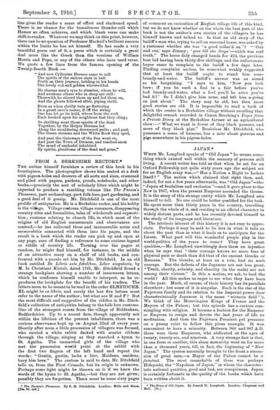JAPAN.*
WHEN Mr. Longford speaks of "Old Japan" be means some- thing which existed well within the memory of persons still living. A recent writer has told us that when he sat for an Oxford Fellowship not quite sixty years ago the subject set for an English essay was,—" Has a Nation a Right to Isolate Itself ? " The nation which claimed that right then, and, indeed, for not a few years afterwards, was "Old Japan"—the " Japan of feudalism and exclusion "—and it gave place to the New in 1867, when the present Emperor ascended the throne. It is the story of this strange entity which Mr. Longford sets himself to tell. No one could be better qualified for the task. He spent more than thirty years in the country, travelling through the whole of it, and residing in an official character in widely distant parts, and he has recently devoted himself to the study of its language and literature.
The intrinsic interest of this history it is not easy to appre- ciate. Perhaps it may be said to lie less in what it tells us about the past than in what it leads us to anticipate for the future. What part will this wonderful people play in the world-politics of the years to come ? They have great qualities,—Mr. Longford unwittingly does them an injustice when he says that "their courage knows no more fear of physical pain or death than did that of the ancient Greeks or Romans." The Greeks, at least as a rule, had no such courage. But the defects of the Japanese are not less great. "Truth, charity, sobriety, and chastity (in the male) are not
among their virtues." Is this a nation, we ask, to lead the world ? All this makes us eager to see what they have been
in the past. Much, of course, of their history has its parallels elsewhere ; but some of it is singular. Such is the rise of the Fujewara family and its relation to the Imperial power (how characteristically Japanese is the name "wistaria field" !). We think of the Merovingian Kings of France and the Mayors of the Palace; but this episode has a curious com- mingling with religion. It became a fashion for the Emperor or Empress to resign and devote the last years of life to. meditation. And then the Fujewara Premiers put pressure on a young ruler to follow this pious example. It was convenient to have a minority. Between 968 and 987 A.D. there were three Emperors, who abdicated at the ages of twenty, twenty-six, and nineteen. A very strange fact is that, in one form or another, this sham monarchy went on for more than a thousand years, till, in fact, the beginning of "New Japan." The system naturally brought to the front a succes- sion of great men,—a Mayor of the Palace cannot be a fainéant. The most remarkable of these was perhaps Hideyoshi, the "Napoleon of Japan," in whom the character- istic national qualities, good and bad, are conspicuous. Japan is certainly fortunate in the quality of the books which have been written about it.
• The Story of Old Japan, By Joseph H. Longford. London: Chapman and Hall. [6s.]










































 Previous page
Previous page